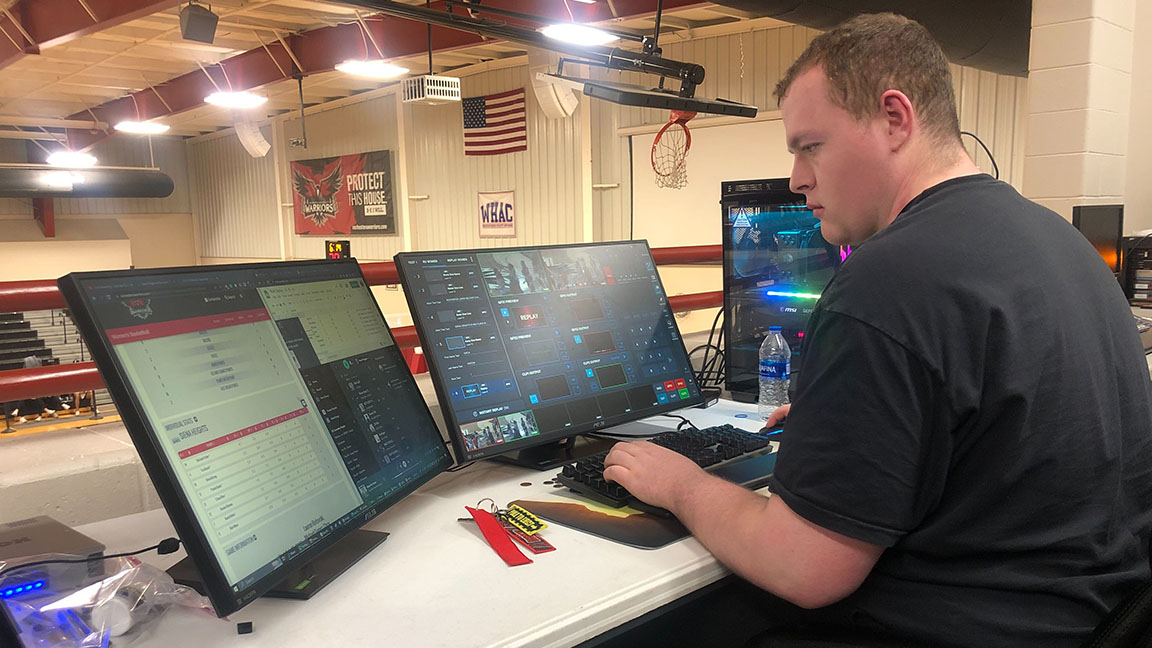
Daniel Higgins was hired by Chyron as an operations specialist for the company's cloud-based live video production platform, Chyron LIVE, in 2023. The previous year, he graduated from Rochester University in Rochester Hills, MI—but not before literally creating the Rochester Sports Network (RSN), which provides livestream coverage of the school’s various sports teams. Here’s how he developed the idea and eventually migrated to a cloud-based production workflow.
SCN: You started a student-run sports network at your university? How did that happen?

Daniel Higgins: My interest in broadcast started in high school, and going into college at Rochester University, I wanted to continue pursuing that passion. In the spring semester of my freshman year, I started poking at the athletic department to see if they wanted to livestream sports. They weren't doing it at the time. It's a small college with just 1,600 enrollments, so things like that tend to be student-run.
I made my case to the athletic director and sports information director, explaining that I had production experience not only in high school but also through a summer internship with the Battle Creek Bombers, a collegiate baseball team playing in the Northwoods League. I said, “I can do that for you,” with a little help.
[Cloud Power: Pricing Modern Infrastructures]
They handed me a budget of $750 and told me to buy equipment and get started. I did more research than I ever had into equipment because I had to make the most of it, and I had to explain why every piece of gear mattered. I’d present $5,000 mock budgets, and they just couldn’t understand the upfront cost of acquiring new equipment and starting up production. It was the first of many times I’ve had that kind of conversation. Lucky for me, it paid off.
SCN: How you were able to run the network on your own?
DH: The sports information director expected live streaming, and it was up to me to create it. Using my graphic design background, I worked on the branding of the broadcast, so it aligned with the university but also was its own unique thing. The first broadcast was Oct. 13, 2018. I started with men’s and women’s basketball the first year, and the second year they asked me to do volleyball and wrestling—and liked what I did so much that they offered me a scholarship. Larger schools in our conference had larger production teams and setups than RSN did as a student-run operation, but we managed to build a following of nearly 2,000 subscribers—more than our student base—over the years.
SCN: At some point you switched from a conventional production setup to a cloud-based live production platform. Why did you make the jump?
DH: I had gone through the Chyron Academy to build the skills I’d need as a PRIME CG operator, so I had connections within Chyron already and was able to get a look at Chyron LIVE shortly after it was first released. As a cloud-based solution, it seemed really cool. And after seeing a demo, I offered to put it through its paces for RSN.
Putting new equipment into sports production or any fast-paced environment is tough, and sometimes it’s a trial by fire. I suggested using LIVE for a couple of upcoming basketball games and got my sports information director on board. We rented a couple of Panasonic SDI cameras and ran them into a Matrox Monarch Edge encoder, which synchronized the camera feeds and streamed them to Chyron LIVE via SRT. I just used my personal PC to access the platform.
Putting new equipment into sports production or any fast-paced environment is tough, and sometimes it’s a trial by fire.
I was able to train the student-athlete volunteers who showed up just hours before the game, and suddenly—for the first time—I had camera operators and a replay operator. We had one tight shot and one game shot, both run by athletes who only needed to be told, “Follow the ball, just like in the NBA.” Chyron provided support and feedback throughout.
That first live production was a huge learning experience, not just because I was new to LIVE, but also because I had so many more tools than I had before. The system I’d been using previously only allowed for static, predefined 2D visual overlays. With Chyron LIVE, I was able to incorporate custom real-time motion graphics that had the look and feel of graphics on major sports networks, but with unique RSN branding elements. Streaming itself is simple because the platform supports most streaming protocols and provides a direct connection to major streaming platforms such as YouTube, Facebook Live, and Twitch.
SCN: How did the move to a cloud-based production system benefit the university?
DH: With some knowledge and work on graphics, we were able to create live streams with a distinctive look rather than the stock template look you see if you’ve watched a lot of college sports broadcasts. With LIVE, the production team (no matter how large or small) has control over the look and can even create themes around special events.
[Cloud-Based Production: Opportunity or Threat for Integrators?]
As a result, productions with LIVE can become promotional and recruitment tools, which makes it an investment that brings back a return, be it student-athletes more interested in participating in sports at the university or journalism students and others who want to train in broadcasting.
LIVE provides access to a robust set of tools that are easy to use, and the nature of the system allows a team to scale up to take full advantage of those tools. The challenge lies in building the team to use them and make those possibilities a reality. Simply by adding a commentator, telestrator, and an additional camera operator, you create a pretty sizeable product and a better-than-average production. In short, LIVE made professional production values accessible and affordable, and we had the freedom to do as much with the platform as our team could manage.







